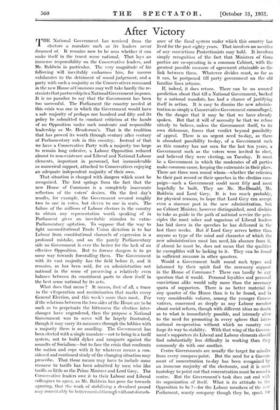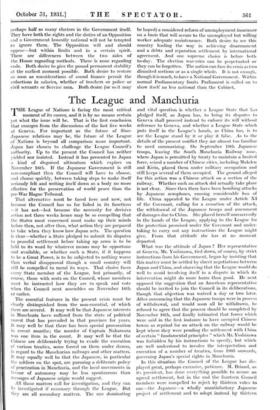After Victory
THE National Government has received from the electors a mandate such as its leaders never dreamed of. It remains now to be seen whether it can make itself in the truest sense national. That lays an immense responsibility on the Conservative leaders, and Mr. Baldwin in particular. The very magnitude of his following will inevitably embarrass him, for success exhilarates to the detriment of sound judgement, and a party with such a majority as the Conservatives command in the new House of Commons may well take hardly the re- straints that partnership in a National Government imposes. It is no paradox to say that the Government has been too successful. The Parliament the country needed at this crisis was one in which the Government would have a safe majority of perhaps one hundred and fifty and its policy be submitted to constant criticism at the hands of an Opposition under such moderate and responsible leadership as Mr. Henderson's. That is the tradition that has proved its worth through century after century of Parliamentary rule in this country. Instead of that we have a Conservative Party with a majority too large to remain long cohesive, a Labour Opposition reduced almost to non-existence and Liberal and National Labour elements, important in personnel, but inconsiderable as numerical support, attached to Conservatives enjoying an adequate independent majority of their own.
That situation is charged with dangers which must be recognized. The first springs from the fact that the new House of Commons is a completely inaccurate reflection of the voters' desires. On the first day's results, for example, the Government secured roughly two to one in votes, but eleven to one in seats. The failure of the millions of Labour electors in the country to obtain any representation worth speaking of in Parliament gives an inevitable stimulus to extra- Parliamentary agitation. To suppose that the way to fight unconstitutional Trade 'Union dictation is to bar Labour from constitutional channels of expression is a profound mistake, and on the purely Parliamentary side no Government is ever the better for the lack of an effective Opposition. But to foresee dangers is to go some way towards forestalling them. The Government with its vast majority has the field before it, and it remains, as has been said, for an administration not national in the sense of preserving a relatively even balance between its constituent parts to show itself in the best sense national by its acts.
What does that mean ? It means, first of all, a truce to the vituperation and recrimination that marks every General Election, and this week's more than most. For if the relations between the two sides of the House are to be such as to perpetuate the bitterness the election inter- changes have engendered, then the purpose a National Government was to serve Will be largely frustrated, though it may carry its measures through the lobbies with a majority there is no assailing. The Government has been elected with a single mandate—not to bring in a tariff system, not to build dykes and ramparts against the assaults of Socialism—but to face the crisis that confronts the nation and cope with it by whatever means a con- sidered and continued study of the changing situation may prescribe. That those means may have to include some recourse to tariffs has been admitted by men who like tariffs as little as the Prime Minister and Lord Grey. The Conservative leaders owe it to their Labour and Liberal colleagues to agree, as Mr. Baldwin has gone far towards agreeing, that the work of stabilizing a devalued pound may conceivably be better carried t h rough with out disturb- ance of the fiscal system under which this country has lived for the past eighty years. That involves no sacrifice of any convictions Protectionists may hold. It involves simply recognition of the fact that Ministers of three parties are co-operating in a common Cabinet, with the greatest possible measure of agreement attainable as the link between them. Whatever divides must, so far as it can, be postponed till party government on the old familiar lines returns.
If, indeed, it does return. There can be no assured prediction about that till a National Government, backed by a national mandate, has had a chance of justifying itself in action. It is easy to dismiss the new adminis- tration as simply a Conservative Government. camouflaged: On the danger that it may be that we have already spoken. But that it will of necessity be that we refuse utterly to believe, unless the Government itself, to its own dishonour, forces that verdict beyond possibility of appeal. There is an urgent need to-day, as there is abundant possibility to-day, of a Government such as this country has not seen for the last ten years, a Government such as the voters were invited to elect, and believed they were electing, on Tuesday. It must be a Government in which the moderates of all parties make common cause, keeping the extremists in their place. There are three men round whom—whether the criterion be their past record or their speeches in the election cam- paign—such a Government could most fitly and most hopefully be built. They are Mr. MacDonald, Mr: Baldwin and Lord Grey. It is too much probably, for physical reasons, to hope that Lord Grey-can accept even a sinecure post in the new administration, but no Cabinet Minister, however distinguished, need disdain to take as guide in the path of national service the prin- ciples the most sober and sagacious of Liberal leaders has laid down in the speeches he has delivered in the last three weeks. But if Lord Grey serves better than anyone as type of the mind and .character of which the new administration most has need, his absence from it, if absent he must be, does not mean that the qualities he exemplifies will be lacking to it. They can be found in sufficient measure in other quarters.
Would a Government built round such types and informed by their spirit find the necessary support in the House of Commons ? There can hardly be any question that it would. Personal loyalties and personal convictions alike would rally more than the necessary quota of supporters. There is no better material in any quarter of the House than is to be found, and in very considerable volume, among the younger Conser- vatives, concerned as deeply as any Labour member about social reform, though with different ideas no doubt as to what is immediately possible, and intensely alive to the need for promoting in every sphere that inter- national co-operation without which no country can forge its way to stability. With that wing of the Govern- ment's supporters its Liberal and Labour elements should find substantially less difficulty in, working than they commonly do with one another.
Centre Governments are usually the target for missiles from every compass-point. But the need for a Govern- ment of concentration to-day has been recognized by an immense majority of the electorate, and it is mere tautology to point out that concentration must be round a centre. But the Government's task does not end with its organization of itself. What is its attitude to the Opposition to be ?—for the Labour members of the new Parliament, scanty company though they be, speak for perhaps half as many electors in the Government itself.. They have both the rights and the duties of an Opposition and a Government honestly national will not be tempted to ignore them. The Opposition will and should oppose—but within limits and in a certain spirit. There are differences between the two sides of the House regarding methods. There is none regarding ends. Both desire to give the pound permanent stability at the earliest moment possible. Both desire to restore as soon as considerations of sound finance permit the reductions in salaries, whether of teachers or police or civil servants or Service men. Both desire (or so it may be hoped) a considered reform of unemployment insurance- on a basis that will secure to the unemployed but willing worker adequate maintenance. Both desire to see this country leading the way in achieving disarmament and a debts and reparation settlement by international agreement. And one supreme choice is before both to-day. The election war-cries can be perpetuated or they can be forgotten. The nation can face its crisis as two disunited sections or as a single whole. It is not enough, though it is much, to have a National Government. Within normal Parliamentary limits Parliament is called on to show itself no less national than the Cabinet.







































 Previous page
Previous page